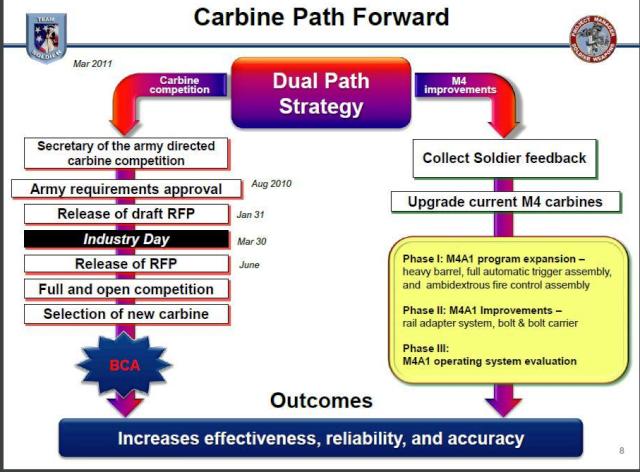Soldier Systems is reporting that the Army has decided to cancel the Individual Carbine competition. This was the Army’s search for a replacement for their current carbines the M4 and M4A1. The cancellation was done because none of the contenders made a high enough score to make it to the next round of the competition.
From the Army’s release:
The IC program consisted of a three-phased competitive strategy to determine whether industry could provide a best-value, improved alternative to the M4A1 carbine. Phase I consisted of reviews of vendor proposals and non-firing evaluations of bid samples. All vendors successfully met Phase I criteria. In 2012, the Army commenced Phase II of the competition, which subjected IC candidates to rigorous evaluations that tested the extreme limits of weapon performance in such areas as weapon system accuracy, reliability, and durability. For Phase III, the Army planned to award between zero and three contracts for weapons meeting Phase II requirements for further environmental and operationally oriented Soldier testing. Upon completion of all testing, the Army planned to conduct a cost benefit analysis between the top performing competitor and the M4A1 carbine.
At the conclusion of Phase II testing, however, no competitor demonstrated a significant improvement in weapon reliability — measured by mean rounds fired between weapon stoppage. Consistent with the program’s search for superior capability, the test for weapon reliability was exceptionally rigorous and exceeded performance experienced in a typical operational environment.
Based upon Army analysis, test results may have been affected by interaction between the ammunition, the magazine and the weapon. The Army’s existing carbine requirement assumed use of the M855 ammunition; the weapons tested in the IC competition all fired the next generation M855A1 Enhanced Performance Round (EPR) currently in fielding. The use of the M855A1 round likely resulted in lower than expected reliability performance. These effects are unique to testing conditions and are not known to affect the reliability of any weapon in the operational environment.
The remaining monies from this program will now be reallocated to other Army budget priorities. There is some speculation that this is the real reason they ended the competition.
The end result is that that Army will continue to field the M4A1 and will not be buying such weapons as the FN SCAR, the Remington ACR, or the HK 416 or the like. Colt Defense and Adcor Defense were also in the competition.

